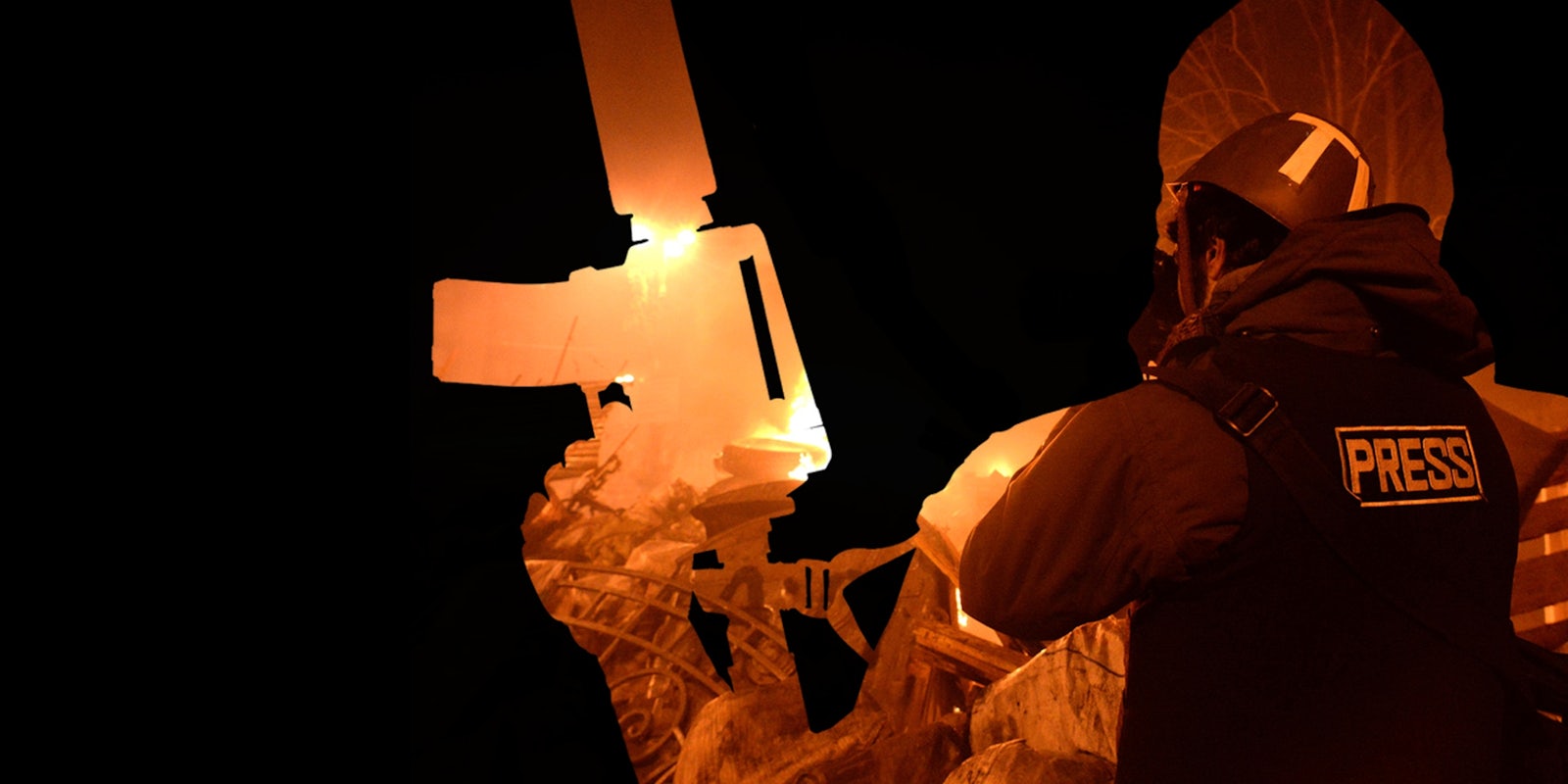The world is reeling that two British Vice News reporters and their Turkish interpreter investigating the Islamic State weren’t just been held by police, they were charged with aiding the group.
The reporters, Jake Hanrahan and Philip Pendlebury, as well as Muhammed ?smail Resul, were detained by the police in Ba?lar neighbourhood of Diyarbak?r, Turkey. They’d been covering the country’s intensified conflict with Turkish separatist group PKK, which has recently turned into urban warfare in the Eastern Kurdish towns. The next day, Diyarbak?r’s governor claimed their detention was “because they lack proper [government] accreditation,” which is common procedure in any of the more than a hundred “military security zones” in the Eastern Turkish towns. They were held in the Diyarbak?r police station’s anti-terrorism branch, though—which is not common. On Monday, a Turkish court charged them with terrorism.
How does the law allow such a thing?
You can thank Turkey’s broad anti-terrorism laws, how the country fights ISIS, and how it uses that fight as an excuse to crack down on an old foe: the Kurds.
After a suicide bombing attack in July that took 32 civilian lives, the Turkish government blamed Islamic State jihadists and began deploying air strikes on the terrorist group’s positions in Northern Syria. Turkey also made a deal with the U.S., allowing U.S. war planes to use Turkish air bases when attacking ISIS and hoping to create a controversial “safe zone” in Northern Syria for the possible return of 1.8 million Syrian refugees in Turkey.
But Turkey quickly began attacking more than just ISIS, broadened its targets to include northern Iraq, where it bombed camps of the PKK, with which the Turkish government has periodically fought with for decades.
In recent years, peace talks between Turkey and the PKK showed promise. In March 2013, PKK’s leader Abdullah Öcalan even called for a “farewell to arms.” But that changed drastically in September 2014, when ISIS besieged Kobani, a Kurdish town on the Syria-Turkey border. Turkey’s Kurds wanted to join Syria’s Kurds for the fight against ISIS, but Turkish President Recep Tayyip Erdo?an closed the border, frustrating the U.S. in the process. Kurds’ Kobani protests against Erdo?an turned into street clashes where dozens were killed.
After Erdo?an’s AKP party lost power in the July parliamentary election, thanks in large part to losing the Kurdish voter base, the government took a more hawkish policy against PKK. Along with the airstrikes which started last month, hundreds of pro-Kurdish activists have been detained as “terror suspects,” and more than 65 websites of news agencies, newspapers, and pro-PKK websites are blocked by the government.
This is the world Vice News reporter Jake Hanrahan had been following.
Hanrahan was in Turkey during the Kobani protests last year, and came to ??rnak and Diyarbak?r to cover the recent clashes. His recent photos show how the PKK’s youth branch took cover from police snipers.
This is a potential violation of Turkey’s notorious Anti Terrorism Law. The law is so “broadly worded,” as the Committee to Project Journalists has described it, it has “allowed Turkish authorities to conflate the coverage of banned groups and investigation of sensitive topics with outright terrorism or other anti-state activity.”
Article 2 of the law is particularly controversial: “Those who commit a crime on behalf of a [terrorist] organisation, even if they are not a member of, shall be charged with terrorism offences.” This wording becomes very vague when courts don’t scrutinize how the suspects undertook such a role, save a prosecutor’s interpretation.
The Vice News team’s first trial is months away, though with terrorism offences, Turkey technically can hold a suspect in pre-detention for up to five years. Based on previous cases, their crime is likely the “terrorism propaganda.”
They also may be tried under Article 7 of the Anti Terrorism Law, which states that “Those who make propaganda of a terrorist organisation by legitimising, glorifying or inciting the violent methods or threats shall be punished by confinement in jail not less than one year and not more than five years.”
So when Jake Hanrahan and Philip Pendlebury report about a militant who claims self-rule and holds a rifle, Turkish courts can interpret that they are making propaganda of PKK, even if they aren’t members of the group.
That appears to be the court’s logic. Vice says that the reporters were interrogated by the anti-terror police about “alleged links to [both] Islamic State and Kurdish militants.” The three three men are charged with “terrorism offenses,” which the judge described as “aiding a terrorist organisation willingly, despite not being a part of its hierarchical organisation.”
What will happen to them is anyone’s guess, but foreign journalists recently taken into custody in Turkey often are let go before long, if given a hard time coming back.
Jake Hess, an American freelance journalist who was writing for Inter Press Service (IPS), was detained in Diyarbak?r in 2010 for similar charges. After being held for 10 days, he was deported and barred from reentering the country. More recently, Dutch freelance journalist and author Frederike Geerdink was similarly charged for “terrorism propaganda” after she interviewed PKK members. Although she was acquitted at the local court, a prosecutor appealed that decision, and her case may take years to resolve.
Photo via theglobalpanorama/Flickr (CC BY SA 2.0) | Remix by Fernando Alfonso III

